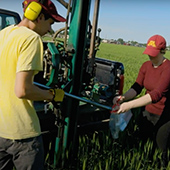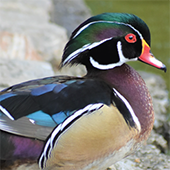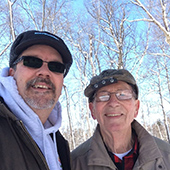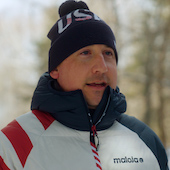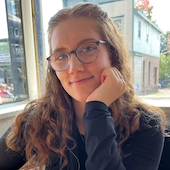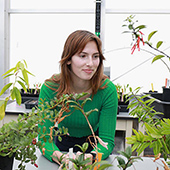- Features: Agricultural nutrient management; Innovation aims to reduce maternal mortality.
- Awards and Recognition: The Department of Family Medicine and Community Health’s Research Division has been ranked number two among family medicine departments in the nation by the Blue Ridge Institute; and more.
Agricultural nutrient management
Lindsay Pease and Yuxin Miao are researching strategies to help farmers manage nutrients and protect water resources, with the goal of maximizing profits for producers and minimizing the impact on Minnesota’s rivers, lakes, and groundwater. Both are part of the Agricultural Research, Education, Extension and Technology Transfer program.
Innovation aims to reduce maternal mortality
The maternal mortality rate in the U.S. is the highest of any developed country, and that rate—currently 17.2 per 100,000—keeps climbing. Moreover, most of those deaths are preventable. Five University of Minnesota biomedical engineering students and one experienced nurse-midwife, Assistant Professor Carrie Neerland, set out to help change that through the invention of the DuoPouch.
Awards and Recognition
The Department of Family Medicine and Community Health’s Research Division has been ranked number two among family medicine departments in the nation by the Blue Ridge Institute for Medical Research; Jerica Berge, along with two teams of co-investigators, has been awarded NIH R01 grants totaling more than $6.4 million; U in the News features highlights of University faculty and staff cited in the media.
March 3 - University and Faculty Senate meeting
University and Faculty Senates will meet to discuss, among other things, a resolution on graduate assistant fees, and to vote on a resolution to amend the University's non-discrimination policy to include protections against caste-based discrimination. The meeting will be livestreamed on YouTube, 2:30-5 p.m. See the agenda for more information.
Safety of minors information for youth programs/activities/interns
Youth programs, activities, and events engaging with minors (under 18) must comply with the U of M's Safety of Minors policy and must be registered annually on the Youth Central Registration System. Program leaders/heads of units are encouraged to be a part of the pre-college network. Email Youth Safety and Compliance Manager Jazmin Danielson for more information and learn about various professional learning opportunities related to operating a safe and effective youth program.
Adding autonomous vehicles to ride-hailing fleets could benefit platforms and drivers
In recent work, University researchers examined an important application of autonomous vehicle (AV) technology: ride hailing. Several of the leading ride-hailing platforms, such as Uber and Lyft, are making substantial investments in the research and development of AV technology. The U of M team examined how deploying a mixed fleet of AVs and conventional vehicles could affect a platform’s operational decisions.
New student-led organization connects medical students to vulnerable youth
University of Minnesota Medical School students recognized a community need and initiated a solution. MD Link is a new student-led organization that aims to provide early intervention for youth who are at a higher risk of or who are already experiencing homelessness, foster care, sex trafficking, or involvement in the juvenile justice system.
Researchers develop guidance for fish-friendly culverts in a changing climate
Designing infrastructure to handle the impacts of climate change is becoming a priority for transportation agencies. Culverts are one example. Road-stream crossings are critical not only for roadway safety and longevity but also for fish and other aquatic organisms that need to move through a stream network. St. Anthony Falls Laboratory researchers have been working toward the overarching goal of improving stream connectivity at road-stream crossings.
Research Brief: Study shows strong winter and summer warming in Minnesota by 2100
Minnesota’s winters are warming faster than nearly any other state in the contiguous United States, but according to a new study by researchers from across the University of Minnesota, summers are beginning to heat up too. Additional recent Research Briefs include “New prevalence data on sex trading shows disproportional impact on transgender and gender diverse high school students,” “Potential impacts of emerald ash borer on wildlife in black ash wetlands,” “Eye in the sky helps scientists ‘see’ underground,” and “Using lasers and a long-term experiment to investigate how deer change a forest canopy.”
March 15 - Mini-Webinar: Technology Commercialization 101
Join Technology Commercialization staff and members of the research community to learn how to move your work from the academic setting out into the world. This webinar will provide an overview of the Tech Comm office, including what staff there do well and how to effectively work with them. The event was designed for researchers who are new to technology commercialization, but it is open to anyone at any stage of their career. Noon-12:30 p.m.
U of M featured virtual events
March 2 - Birds Through Dakota Eyes
March 3 - From Global Health to Safety, Why We Need the Every Woman Treaty
March 3 - Centering Access & Inclusion
March 4 - Reflecting on the 60th Anniversary of the Eichmann Trial: Contemporary Impacts
March 16 - Webinar: Critical Thinking: Making Decisions that Stick
Alum learned core values that set up career in watershed industry
While working in an industry with an ever changing environment and constant technological developments, University of Minnesota Crookston alum Jon Roeschlein resorts back to the core values he learned as a student. Roeschlein was recently hired as district administrator for the Sauk River Watershed District and has been in the watershed industry for over 30 years.
Video: Jason Kask - Beijing Paralympics Ski Technician
Jason Kask, an instructor in UMD’s Applied Human Sciences Department, is working at the Paralympics in Beijing. In addition to waxing skis and prepping gear for the athletes, Kask has been logging many kilometers a day testing equipment. “Having the opportunity to bring that back and share those experiences with the students will be really fun,” says Kask.
Johnson appointed to International Joint Commission
Lucinda Johnson, research director of the Natural Resources Research Institute, has been appointed to a U.S. co-chair position with the International Joint Commission (IJC). The commission was established by the United States and Canada to jointly manage shared waters. Johnson served as a member of the IJC Science Priority Committee and co-leads a workgroup to design a framework for an early warning system for the Great Lakes.
The skills to succeed
College of Education and Human Service Professions (CEHSP) alum Michaela Scharmer works for Lutheran Social Services helping youth prepare to age out of foster care. “I get to help facilitate groups where we build the curriculum ourselves. It’s about different life skills, like money management, housing, employment, and stress management,” says Scharmer. She credits her success to her time in CEHSP and her work as a peer advisor.
Cougar women's basketball coach reaches 250-win milestone
University of Minnesota Morris women's basketball coach Tim Grove picked up his 250th win as the Cougars closed out the regular season with a 93-44 rout of Northland College.
March 15 - UMR and Mayo Clinic: Kern Center Connects
The University of Minnesota Rochester and Mayo Clinic: Kern Center Connects March event will feature “COVID-19: Research to inform practice, policy, and planning.” 5 p.m. The Kern Center Connects program is designed to inform students, staff, faculty, and the broader community of current research on critical health challenges.
Black Girl Advocate
Shamaria Jordan ’21 first went abroad as a senior at North Central University, traveling through Israel for three weeks. That experience inspired her to help other young Black girls travel and see new places. Jordan, who received her master’s in Youth Development Leadership from the College of Education and Human Development, founded a nonprofit called Black Girl Advocate. Sales of the clothing she created are helping her bring five girls to Nashville over spring break to experience life outside of Minnesota.
A colorful quest
After 145 million years on the planet, flowering plants have evolved some pretty “ingenious” ways of spreading their genes around while staying firmly put. For one thing, they and some of their pollinators have co-evolved to trade tasty nectar for a pollen pick-up service. Colorless nectars seem to be the rule, so when plants produce colored nectars it raises all sorts of questions. College of Biological Sciences student Leah Hallett has begun a study of the colored nectars that various plants use to attract their pollinators.
Museum exhibit reveals I-35W’s impact on a South Minneapolis community
Many Minnesotans have driven on I-35W through Minneapolis without giving any thought to how the freeway was built—or the impact it has had on the community. That’s changing through the work of U of M researchers, students, and Twin Cities residents. “Human Toll: A Public History of 35W” is an exhibit at the Hennepin History Museum that explores what happens when the construction of a freeway literally and figuratively tears apart a community.
